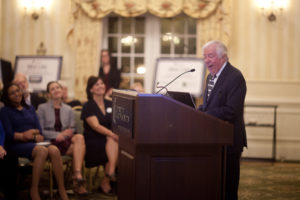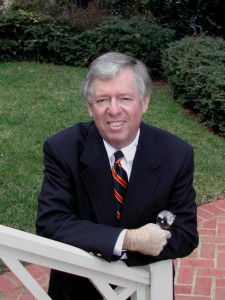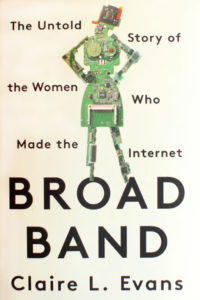 The 17th season of the William B. Crawley Great Lives Lecture Series continues on Tuesday, March 10, with Female Internet Inventors, featuring Claire L. Evans, author of Broad Band: The Untold Story of the Women Who Made the Internet. This series is open to the public free of charge and no admission tickets are required. Programs begin at 7:30 p.m. in Dodd Auditorium in George Washington Hall. Each lecture concludes with an audience Q&A session with the speaker and a book-signing. The Theresa Y Crawley, D.D.S. Lecture.
The 17th season of the William B. Crawley Great Lives Lecture Series continues on Tuesday, March 10, with Female Internet Inventors, featuring Claire L. Evans, author of Broad Band: The Untold Story of the Women Who Made the Internet. This series is open to the public free of charge and no admission tickets are required. Programs begin at 7:30 p.m. in Dodd Auditorium in George Washington Hall. Each lecture concludes with an audience Q&A session with the speaker and a book-signing. The Theresa Y Crawley, D.D.S. Lecture.
The history of technology you probably know is one of men and machines, garages and riches, alpha nerds and brogrammers – but female visionaries have always been at the vanguard of technology and innovation. In fact, women turn up at the very beginning of every important wave in technology. They may have been hidden in plain sight, their inventions and contributions touching our lives in ways we don’t even realize, but they have always been part of the story. In Broad Band: The Untold Story of the Women Who Made the Internet (Penguin Random House), Claire L. Evans finally gives these unsung female heroes their due with her insightful social history of the women who made the Internet what it is today.
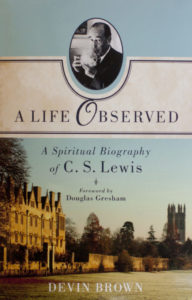 The Great Lives series continues on Thursday, March 12, with C.S. Lewis, featuring Devin Brown, author of A Life Observed: A Spiritual Biography of C.S. Lewis. The Coldwell Banker Elite Lecture.
The Great Lives series continues on Thursday, March 12, with C.S. Lewis, featuring Devin Brown, author of A Life Observed: A Spiritual Biography of C.S. Lewis. The Coldwell Banker Elite Lecture.
Although Clive Staples Lewis died over a half-century ago, his works live on in the hearts and minds of countless readers, young and old, all over the world. From the Lewis Memorial recently installed in Poets’ Corner to the new Narnia films scheduled for release by Netflix over the next decade, the life and legacy of an Oxford don born near the end of the 19th Century continue to impact the current one. In this talk, which features rare archival photographs, you will visit the places that Lewis knew and loved.
The Great Lives series will continue on Thursday, March 19 with America’s Notorious Pirates, featuring author Eric Jay Dolin. Visit https://www.umw.edu/greatlives/ for more information.
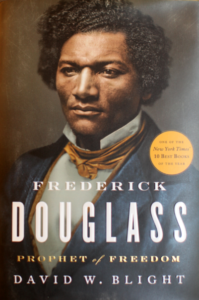 The 17th season of the William B. Crawley Great Lives Lecture Series continues on Thursday, Feb. 27, with abolitionist, orator and author Frederick Douglass, with David W. Blight, author of The New York Times bestseller Frederick Douglass: Prophet of Freedom. This series is open to the public free of charge and no admission tickets are required. Programs begin at 7:30 p.m. in Dodd Auditorium in George Washington Hall. Each lecture concludes with an audience Q&A session with the speaker and a book-signing. The Synergy Periodontics and Implants Lecture.
The 17th season of the William B. Crawley Great Lives Lecture Series continues on Thursday, Feb. 27, with abolitionist, orator and author Frederick Douglass, with David W. Blight, author of The New York Times bestseller Frederick Douglass: Prophet of Freedom. This series is open to the public free of charge and no admission tickets are required. Programs begin at 7:30 p.m. in Dodd Auditorium in George Washington Hall. Each lecture concludes with an audience Q&A session with the speaker and a book-signing. The Synergy Periodontics and Implants Lecture.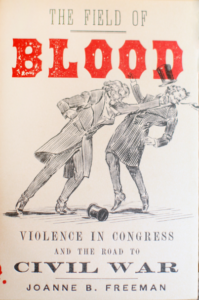 The 17th season of the William B. Crawley Great Lives Lecture Series continues on Thursday, Feb. 20, with American Duelists, presented by author Joanne Freeman. This series is open to the public free of charge and no admission tickets are required. Programs begin at 7:30 p.m. in Dodd Auditorium in George Washington Hall. Each lecture concludes with an audience Q&A session with the speaker and a book-signing. The Hirschler Lecture.
The 17th season of the William B. Crawley Great Lives Lecture Series continues on Thursday, Feb. 20, with American Duelists, presented by author Joanne Freeman. This series is open to the public free of charge and no admission tickets are required. Programs begin at 7:30 p.m. in Dodd Auditorium in George Washington Hall. Each lecture concludes with an audience Q&A session with the speaker and a book-signing. The Hirschler Lecture.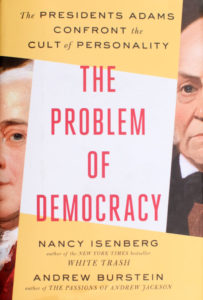 The Great Lives series continues on Tuesday, Feb. 25 with John Adams and John Quincy Adams, presented by Nancy Isenberg and Andrew Burstein, authors of the book, The Problem with Democracy: The Presidents Adams Confront the Cult of Personality. The Parrish Snead Franklin Simpson, PLC Lecture.
The Great Lives series continues on Tuesday, Feb. 25 with John Adams and John Quincy Adams, presented by Nancy Isenberg and Andrew Burstein, authors of the book, The Problem with Democracy: The Presidents Adams Confront the Cult of Personality. The Parrish Snead Franklin Simpson, PLC Lecture.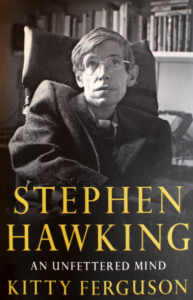 The 17th season of the William B. Crawley Great Lives Lecture Series continues on Tuesday, Feb. 18, with a look at the brilliant and enigmatic scientist and disability icon Stephen Hawking, with biographer Kitty Ferguson. This series is open to the public free of charge and no admission tickets are required. Programs begin at 7:30 p.m. in Dodd Auditorium in George Washington Hall. Each lecture concludes with an audience Q&A session with the speaker and a book-signing. The Dovetail Cultural Resources Group Lecture.
The 17th season of the William B. Crawley Great Lives Lecture Series continues on Tuesday, Feb. 18, with a look at the brilliant and enigmatic scientist and disability icon Stephen Hawking, with biographer Kitty Ferguson. This series is open to the public free of charge and no admission tickets are required. Programs begin at 7:30 p.m. in Dodd Auditorium in George Washington Hall. Each lecture concludes with an audience Q&A session with the speaker and a book-signing. The Dovetail Cultural Resources Group Lecture.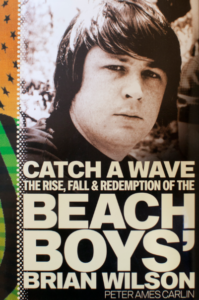 The 17th season of the William B. Crawley Great Lives Lecture Series continues this evening, Feb. 6, with a look at the quintessential American band, The Beach Boys, as well as the artistic genius and downward spiral of its leader, Brian Wilson. Biographer Peter Ames Carlin will talk about his book, Catch a Wave: The Rise, Fall & Redemption of The Beach Boys’ Brian Wilson. This series is open to the public free of charge and no admission tickets are required. Programs begin at 7:30 p.m. in Dodd Auditorium in George Washington Hall. Each lecture concludes with an audience Q&A session with the speaker and a book-signing. The Davenport & Company Lecture.
The 17th season of the William B. Crawley Great Lives Lecture Series continues this evening, Feb. 6, with a look at the quintessential American band, The Beach Boys, as well as the artistic genius and downward spiral of its leader, Brian Wilson. Biographer Peter Ames Carlin will talk about his book, Catch a Wave: The Rise, Fall & Redemption of The Beach Boys’ Brian Wilson. This series is open to the public free of charge and no admission tickets are required. Programs begin at 7:30 p.m. in Dodd Auditorium in George Washington Hall. Each lecture concludes with an audience Q&A session with the speaker and a book-signing. The Davenport & Company Lecture.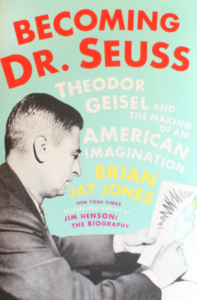 The Great Lives series will continue on Tuesday, Feb. 11, with Becoming Dr. Seuss: Theodor Geisel and the Making of an American Imagination, by Brian Jay Jones, The New York Times bestselling author of Jim Henson: The Biography. The JON Properties/Van Zandt Restorations Lecture.
The Great Lives series will continue on Tuesday, Feb. 11, with Becoming Dr. Seuss: Theodor Geisel and the Making of an American Imagination, by Brian Jay Jones, The New York Times bestselling author of Jim Henson: The Biography. The JON Properties/Van Zandt Restorations Lecture.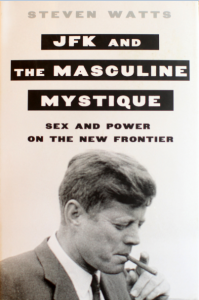 The 17th season of the William B. Crawley Great Lives Lecture Series continues this evening, Jan. 30, with a look at the handsome, young president who was the epitome of masculinity in the early 1960s and the debonair spy who captivated fiction readers and filmgoers, including JFK himself. This series is open to the public free of charge and no admission tickets are required. Programs begin at 7:30 p.m. in Dodd Auditorium in George Washington Hall. Each lecture concludes with an audience Q&A session with the speaker and a book-signing. The John and Linda Coker Lecture.
The 17th season of the William B. Crawley Great Lives Lecture Series continues this evening, Jan. 30, with a look at the handsome, young president who was the epitome of masculinity in the early 1960s and the debonair spy who captivated fiction readers and filmgoers, including JFK himself. This series is open to the public free of charge and no admission tickets are required. Programs begin at 7:30 p.m. in Dodd Auditorium in George Washington Hall. Each lecture concludes with an audience Q&A session with the speaker and a book-signing. The John and Linda Coker Lecture.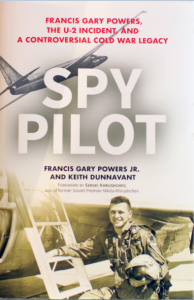 One of the most widely discussed and controversial events of the Cold War was the downing of the American U-2 spy plane piloted by Francis Gary Powers over the Soviet Union on May 1, 1960. The event was recently depicted in the Steven Spielberg movie Bridge of Spies. Powers was captured by the KGB, subjected to a televised show trial, and imprisoned, all of which created an international incident. Soviet authorities eventually released him in exchange for captured Soviet spy Rudolf Abel. On his return to the United States, Powers was exonerated of any wrongdoing while imprisoned in Russia, yet a cloud of controversy lingered until his untimely death in 1977.
One of the most widely discussed and controversial events of the Cold War was the downing of the American U-2 spy plane piloted by Francis Gary Powers over the Soviet Union on May 1, 1960. The event was recently depicted in the Steven Spielberg movie Bridge of Spies. Powers was captured by the KGB, subjected to a televised show trial, and imprisoned, all of which created an international incident. Soviet authorities eventually released him in exchange for captured Soviet spy Rudolf Abel. On his return to the United States, Powers was exonerated of any wrongdoing while imprisoned in Russia, yet a cloud of controversy lingered until his untimely death in 1977.